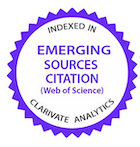Efeito in vitro e in vivo de extratos de eugenia uniflora em nematódeos gastrintestinais de ovinos
DOI:
https://doi.org/10.1590/1089-6891v20e-49037Resumo
Resumo
Este estudo avaliou a ação in vitro e in vivo de extratos de Eugenia uniflora em nematódeos gastrintestinais de ovinos. No teste de inibição da eclodibilidade dos ovos, extratos aquosos e hidroalcoólicos foram testados nas concentrações de 40 a 1,25 mg/mL. O efeito citotóxico foi mensurado através do ensaio de MTT em células VERO nas concentrações de 4000 a 1,95 µg/mL. A composição química foi analisada através da marcha fitoquímica qualitativa. No teste in vivo, foram administrados 100 mg/kg, por via oral, do extrato hidroalcoólico por três dias em ovinos naturalmente infectados e realizada coleta de fezes para estimar a redução de ovos por grama de fezes (OPG). Diferentes extratos de E. uniflora inibiram a eclodibilidade dos ovos, com percentual de inibição variando de 14,56 a 99,75%, sendo os hidroalcoólicos mais promissores que os aquosos. Na marcha fitoquímica, compostos com ação anti-helmíntica comprovada foram observados, como flavonoides, saponinas, taninos e triterpenos. Nas condições testadas, os extratos apresentaram citotoxicidade nula a moderada. In vivo, a redução do OPG foi observada apenas no grupo controle (anti-helmíntico). Os extratos de E. uniflora mostraram-se promissores com ação in vitro, necessitando estudos que avaliem outras concentrações e formas de administração in vivo.
Palavras-chave: planta medicinal; Haemonchus contortus; ruminantes; anti-helmíntico; pitangueira.
Downloads
Publicado
Como Citar
Edição
Seção
Licença
Copyright (c) 2019 Ciência Animal Brasileira

Este trabalho está licenciado sob uma licença Creative Commons Attribution 4.0 International License.
Autores que publicam nesta revista concordam com os seguintes termos:
- Autores mantém os direitos autorais e concedem à revista o direito de primeira publicação, com o trabalho simultaneamente licenciado sob a Licença Creative Commons Attribution que permite o compartilhamento do trabalho com reconhecimento da autoria e publicação inicial nesta revista.
- Autores têm autorização para assumir contratos adicionais separadamente, para distribuição não-exclusiva da versão do trabalho publicada nesta revista (ex.: publicar em repositório institucional ou como capítulo de livro), com reconhecimento de autoria e publicação inicial nesta revista.
- Autores têm permissão e são estimulados a publicar e distribuir seu trabalho online (ex.: em repositórios institucionais ou na sua página pessoal) a qualquer ponto antes ou durante o processo editorial, já que isso pode gerar alterações produtivas, bem como aumentar o impacto e a citação do trabalho publicado (Veja O Efeito do Acesso Livre).






























